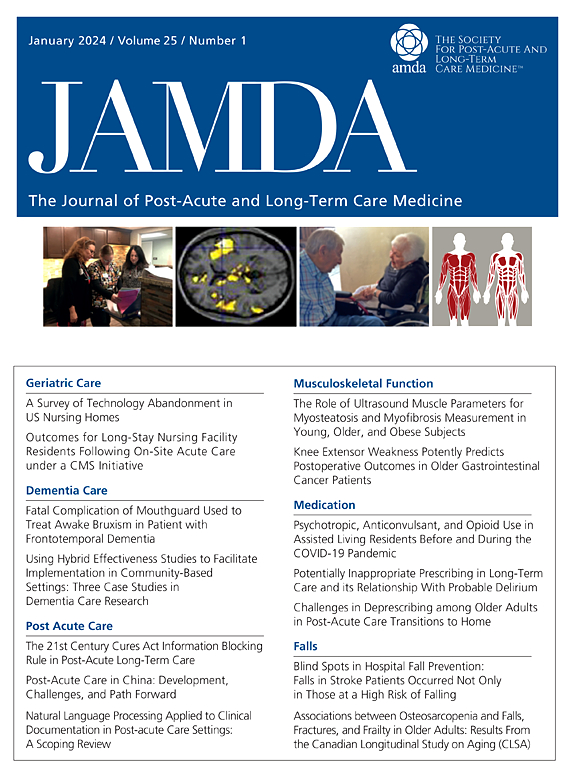Health Literacy and Health-Related Quality of Life in Older Adults with Mild Cognitive Impairment
IF 4.2
2区 医学
Q2 GERIATRICS & GERONTOLOGY
Journal of the American Medical Directors Association
Pub Date : 2024-09-10
DOI:10.1016/j.jamda.2024.105253
引用次数: 0
Abstract
Objectives
Health literacy is considered crucial in health status outcomes, but little is known about the association among cognitively impaired persons. This study investigated the association between health literacy and health-related quality of life (HRQoL) in older adults with mild cognitive impairment (MCI). We further examined whether the association between health literacy and HRQoL depends on age, sex, and educational attainment.
Design
A cross-sectional study was conducted between January and December 2022.
Setting and Participants
The study population was 233 older adults with MCI who visited the Veterans Health Service Medical Center in Seoul, Republic of Korea.
Methods
The diagnosis of MCI was confirmed by a physician based on clinical and neuropsychological assessments. The European Health Literacy Survey Questionnaire and EuroQol Five Dimensions Questionnaire were used to measure the health literacy and HRQoL of the participants.
Results
HRQoL was significantly correlated with health literacy (R = 0.25, P ≤ .001) and its 3 subdomains (R = 0.27, P ≤ .001 for healthcare; R = 0.19, P = .004 for disease prevention; and R = 0.18, P = .005 for health promotion). After adjustment for potential covariates, older adults with higher levels of health literacy were significantly associated with better HRQoL: β = 0.02 (P = .0021) for health literacy, β = 0.07 (P = .0001) for healthcare, and β = 0.04 (P = .0443) for disease prevention. The interactions between HRQoL and health literacy with the specific variables of age, sex, and education demonstrated a statistical significance (β = 0.02 with age, β = 0.03 with sex, and β = 0.06 with education).
Conclusions and Implications
There was a significant association between health literacy and HRQoL among older adults with MCI. This finding suggests that improving health literacy of older adults with MCI may enhance HRQoL. An education intervention is recommended to reduce the existing health disparities due to low health literacy.
轻度认知障碍老年人的健康素养和与健康相关的生活质量。
目的:健康素养被认为是影响健康状况的关键因素,但人们对认知障碍患者的健康素养与健康相关生活质量之间的关系知之甚少。本研究调查了轻度认知障碍(MCI)老年人的健康素养与健康相关生活质量(HRQoL)之间的关系。我们还进一步研究了健康素养与 HRQoL 之间的关系是否取决于年龄、性别和教育程度:设计:一项横断面研究于 2022 年 1 月至 12 月间进行:研究对象:在韩国退伍军人健康服务医疗中心就诊的233名患有MCI的老年人:MCI的诊断由医生根据临床和神经心理学评估确认。采用欧洲健康素养调查问卷和 EuroQol 五维问卷来测量参与者的健康素养和 HRQoL:结果:HRQoL与健康素养(r=0.25,P≤.001)及其3个子域(r=0.27,P≤.001,涉及医疗保健;r=0.19,P=.004,涉及疾病预防;r=0.18,P=.005,涉及健康促进)明显相关。在对潜在的协变量进行调整后,健康素养水平较高的老年人与较好的 HRQoL 显著相关:健康素养 β = 0.02(P = 0.0021),医疗保健 β = 0.07(P = 0.0001),疾病预防 β = 0.04(P = 0.0443)。HRQoL 和健康素养与年龄、性别和教育程度等特定变量之间的交互作用具有统计学意义(β = 0.02 与年龄有关,β = 0.03 与性别有关,β = 0.06 与教育程度有关):在患有 MCI 的老年人中,健康素养与 HRQoL 之间存在明显的关联。这一发现表明,提高患有 MCI 的老年人的健康素养可提高其 HRQoL。建议采取教育干预措施,以减少因健康素养低而导致的现有健康差异。
本文章由计算机程序翻译,如有差异,请以英文原文为准。
求助全文
约1分钟内获得全文
求助全文
来源期刊
CiteScore
11.10
自引率
6.60%
发文量
472
审稿时长
44 days
期刊介绍:
JAMDA, the official journal of AMDA - The Society for Post-Acute and Long-Term Care Medicine, is a leading peer-reviewed publication that offers practical information and research geared towards healthcare professionals in the post-acute and long-term care fields. It is also a valuable resource for policy-makers, organizational leaders, educators, and advocates.
The journal provides essential information for various healthcare professionals such as medical directors, attending physicians, nurses, consultant pharmacists, geriatric psychiatrists, nurse practitioners, physician assistants, physical and occupational therapists, social workers, and others involved in providing, overseeing, and promoting quality

 求助内容:
求助内容: 应助结果提醒方式:
应助结果提醒方式:


